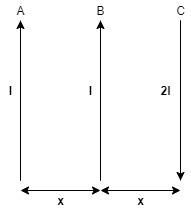Question
Question: A, B and C are parallel conductors of lengths as shown in the figure carrying currents \(I\), \(I\) ...
A, B and C are parallel conductors of lengths as shown in the figure carrying currents I, I and 2I respectively. The distance between A and B is x. The distance between B and C is also x. F1 is the force exerted by B on A. F2 is the force exerted by C on A. Choose the correct answer.

A) F1=2F2
B) F2=2F1
C) F1=F2
D) F1=−F2
Solution
Electric current produces magnetic field. Then these magnetic fields produced by the current-carrying wires will exert force upon the current-carrying wires. Here you need to identify those magnetic fields and calculate the forces accordingly. You also need to carefully note the directions of the magnetic fields and the forces.
Formulae Used:
The magnetic field B due to a current carrying wire carrying current I at a distance of x apart is
B=2πμ0xI
where μ0 is the permeability of vacuum.
The force exerted F on a current carrying wire of length l carrying I current is
F=BIl
Complete step by step answer:
Given:
The current carrying wire A of length l is carrying a current I in upward direction.
The current carrying wire B of length l is carrying a current I in upward direction.
The current carrying wire C of length 2l is carrying a current 2I in downward direction.
F1 is the force exerted by B on A and F2 is the force exerted by C on A.
To get: The relation between F1 and F2.
Step 1:
Current carrying wire A and B are carrying current in the parallel direction.
Hence from right hand rule you can get that the magnetic field BBA due to Bon A will be inward-directed to the plane.
You can calculate the magnetic field BBA from eq (1) when the distance between A and B is x and B carrying current I.
BBA=2πμ0xI
Step 2:
Current carrying wire C and A are carrying current in anti-parallel direction.
Hence from the right-hand rule, you can get that the magnetic field BCA due to C on A will be inward-directed to the plane.
You can calculate the magnetic field BCA from eq (1) when, the distance between C and A is (x+x) and C carrying current 2I.
BCA=−2πμ0(x+x)2I ⇒BCA=−2πμ02x2I ∴BCA=−2πμ0xI
Step 3:
The force exerted on A due to the magnetic field BBA is
F1=BIl =BBAIl =2πμ0xIIl =2πμ0xI2l
Step 4:
The force exerted on A due to the magnetic field BCA is
F2=BIl =BCAIl =−2πμ0xIIl =−2πμ0xI2l
Hence, comparing the two forces you can get
F1=−F2
The correct answer is (D) F1=−F2.
Note:
The direction of the current being different in the cases of B and C, the produced magnetic fields are of different directions. These magnetic fields exert force on A along the perpendicular direction of the respective magnetic fields and hence they are of the opposite direction. Thus, you need to be careful while dealing with directions. Again, one important point where many students fail is the in the eq (2) the length and the current is of the wire itself on which the force is being exerted.
